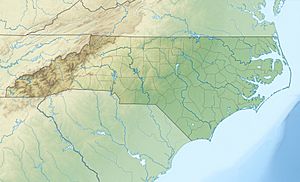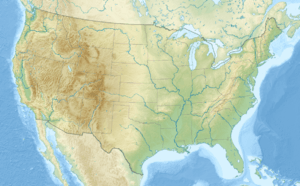Second Creek (Uwharrie River tributary) facts for kids
Quick facts for kids Second Creek |
|
|---|---|
|
Location of Second Creek mouth
|
|
| Other name(s) | Tributary to Uwharrie River |
| Country | United States |
| State | North Carolina |
| County | Randolph |
| Physical characteristics | |
| Main source | Toms Creek divide about 1.5 miles northwest of Martha, North Carolina 545 ft (166 m) 35°37′48″N 080°02′16″W / 35.63000°N 80.03778°W |
| River mouth | Uwharrie River about 3 miles east of Martha, North Carolina 378 ft (115 m) 35°36′28″N 079°58′10″W / 35.60778°N 79.96944°W |
| Length | 5.79 mi (9.32 km) |
| Basin features | |
| Progression | generally southeast |
| River system | Pee Dee River |
| Basin size | 16.98 square miles (44.0 km2) |
| Tributaries |
|
| Bridges | Martha Drive, Salem Church Road, NC 49, Oak Grove Church Road |
Second Creek is a cool stream in Randolph County, North Carolina. It flows for about 5.79 mi (9.32 km) (that's almost 6 miles!). This creek is a "3rd order tributary," which means it's a smaller stream that flows into a bigger one, and that bigger one flows into an even larger river. Second Creek eventually joins the Uwharrie River.
Contents
Where Second Creek Flows
Second Creek starts near a place called Martha, North Carolina. It begins on a high point that separates it from another stream, Toms Creek. Think of it like a tiny spring or a wet spot in the ground.
Journey to the Uwharrie River
From its start, Second Creek generally flows towards the southeast. It winds its way through the landscape. After its journey, it meets up with the Uwharrie River. This meeting point is also close to Martha, North Carolina.
Understanding the Creek's Area
Every creek has a "watershed." This is the entire area of land where all the rain and snow eventually drain into that creek. Second Creek's watershed covers about 16.98 square miles (44.0 km2) (square miles).
Water and Land in the Watershed
This area gets a good amount of rain each year, around 46.9 inches. A lot of the land in the watershed, about 49%, is covered by forests. These forests are important because they help keep the water clean. They also provide homes for many plants and animals.
 | Calvin Brent |
 | Walter T. Bailey |
 | Martha Cassell Thompson |
 | Alberta Jeannette Cassell |



